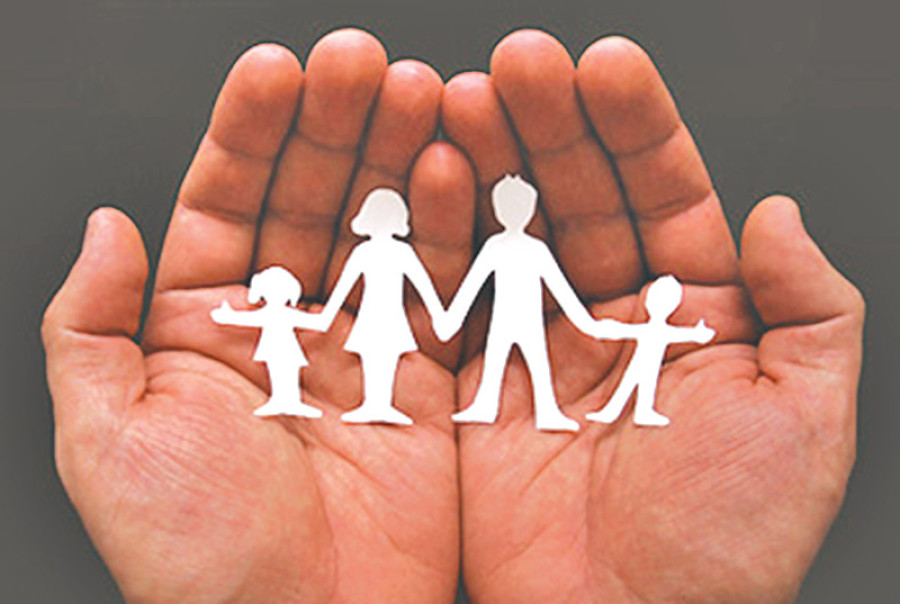Opinion
Happy family, happy world
Families are the basic building blocks of societies worldwide. The wellbeing of families means the wellbeing of the world.
Angur Baba Joshi
Families are the basic building blocks of societies worldwide. The wellbeing of families means the wellbeing of the world. Therefore, this issue deserves maximum attention for the welfare of the global human family. The United Nations has designated May 15 as International Day of Families, and we have been observing it since 1994. The International Day of Families is expected to awaken the government to address family issues, and formulate and implement policies and programmes accordingly. There are certain basic needs which every family has to have to be able to discharge its role as a healthy building block of the entire human family. They are: good food, clothing, shelter, education and health care. Many families in the least developed countries and developing countries do not have all of them. It is very sad that in Nepal, there are still many families that do not possess even one of them.
Social progress
Children and youths in a family deserve first priority, and then grandparents and parents respectively. Families are major agents of sustainable development at all levels of society, and their contribution to that process is crucial for its success. Since the children of today are the citizens of tomorrow, all other family members are expected to promote early childhood education and lifelong learning opportunities for them. Timely immunisation, proper balanced food, appropriate exercise, play and entertainment have to be provided for the balanced physical and emotional wellbeing of children and youths.
This year, the focus of International Day of Families is social progress and a better standard of living. A happy family environment and a proper balance between work and family are important to improve the health and emotional outcome of all family members. The special day also draws our attention to equality between the sexes, women’s equal participation in employment with equal pay and shared parental responsibility which are essential elements of a modern family policy. It is said that the basic foundation of humanity is laid during childhood through the loving care of the parents, especially the mother. Therefore, it is very important to promote women’s employment, equality between the sexes and shared parenting.
A child’s development involves multi-dimensional development covering all four dimensions of human existence—physical, mental, intellectual and spiritual. The body which is the physical existence, is controlled by the mind which, in term, is controlled by the intellect. The fourth level of our existence is our consciousness which enlivens all the other three. This is our spiritual existence, without which the other levels are of no use. It is most important that children are made aware of all these levels of existence and child development efforts cover all these simultaneously. This will bring peace and happiness to all the members of the family, which is the ultimate goal of human life. Unbalanced child development creates problems for the individual, family and society at large. For example, intellectual development alone is not enough. Even dacoits are quite intelligent. What we need is intelligence balanced with the power of discrimination as to what is right and wrong.
Care and involvement
After the children and youths, the grandparents also deserve proper attention. The problems of senior citizens are well-known. In a joint family, the younger generation greatly benefits from the knowledge and experience of the grandparents, and the grandparents too get emotional satisfaction from their children and grandchildren which is very good for both. As people are becoming more and more self-centred with a reduced spirit of tolerance, forbearance and sense of responsibility towards the elderly, the condition of grandparents is becoming worse as unwanted members of the family. Yes, there are old people’s homes and government gratuity for senior citizens. However, they are no emotional substitutes for family care and involvement.
Along with increased gratuity for the elderly, the government should pass a law that forbids children from claiming parental property as a birthright and abandoning the parents. Parents should have the full right to will their property to whoever looks after them. This might encourage families to accept and take good care of their senior members. In case of intestate succession, both daughters and sons should get an equal share. Having worked very hard to raise the family during the prime of their lives, it is very hard and disappointing for the elderly to be neglected in their twilight years. The elders, for their part, should not interfere in how their children manage the household. It can work beautifully as it has for this writer with four generations—a 103-year-old great-grandmother, 86-year-old mother, 67-year-old father, 60-year-old mother and 40-year-old great-grandchild and his wife—all living under the same roof.
With an increasing number of career women working outside the home, it is important that the husband cooperates with the wife in household management, from cleaning and cooking to childcare. It is a necessity that both boys and girls are taught home service in school. It is also important that more day-care centres are opened to take good care of children of working mothers in nuclear families so that they can perform their work well. Last but not least, it is also necessary that the school curriculum includes a compulsory special course covering all the dimensions of a ‘happy family life’ for all generations. This is the message of International Day of Families.
Joshi is a social activist and educator




 17.9°C Kathmandu
17.9°C Kathmandu











